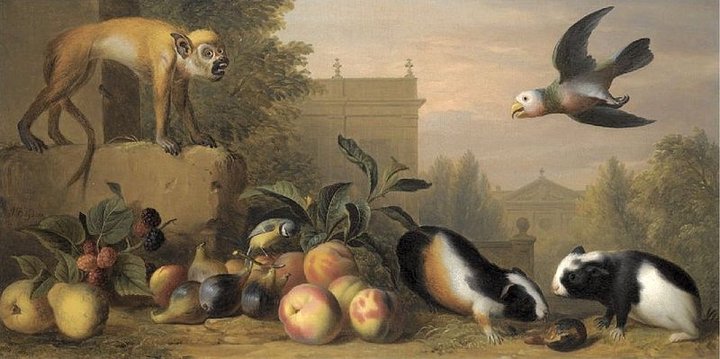
Painting by Jakob Bogdani, circa 1710-1720, entitled, “Capuchin squirrel monkey, two guinea pigs, a blue tit and an Amazon St. Vincent parrot with Peaches, Figs and Pears in a landscape.” Some of these animals aren’t allowed in Eureka. | Image: Public domain, via Wikimedia commons.
The City of Eureka is working on the first update to its animal ordinance in more than half a century, and a draft of the updated rules presented at Tuesday night’s City Council meeting includes some possibly surprising limits on how many pets you can own if you live here.
For example, unless you hold a kennel license you wouldn’t be allowed to own more than three dogs (excluding puppies under four months old).
Same deal with cats — no more than three unless you’re operating a licensed cattery (a word we had to look up to make sure it’s real).
Say you’d like to own a pot-bellied pig. You may, but just one. (Not counting cute li’l piglets under four weeks old.) And if you live in an apartment, or your house is on a smaller lot, no dice. “We don’t want them on small parcels,” Eureka Police Captain Brian Stevens said at last night’s meeting. “Maybe half-acre lot size.”

Villareal
When Mayor Susan Seaman asked if a half-acre lot was really necessary for a pot-bellied pig, EPD Animal Control Officer Celeste Villarreal offered a justification. “Potbelly pigs,” she said, “have really extensive exercise requirements and requirements that are species-specific. It needs to be able to run around. It needs to be able to act in a manner that’s correct for a pig to act in.”
All your pets must be licensed, of course, and in the case of pigs, don’t try sneaking in a Berkshire or some other large domestic swine. “No pig is allowed in the City if it is greater than 22 inches in height at the shoulder or more than 150 pounds in weight,” the draft ordinance reads.
As for combined animal families, the ordinance wouldn’t allow residents to have more than a total of six of any combination of dogs, cats, pot-bellied pigs and miniature goats.
A few more limits:
- Miniature goats: two
- Rabbits: 20 on parcels of less than 5,000 square feet; 30 otherwise
- Domestic rodents, such as hamsters, Guinea pigs, mice and rats: 10
- Chickens or ducks: zero if you’re in an apartment; 10 on parcels of less than 5,000 square feet; 20 otherwise
- Roosters, horses, ponies, mules, burros, sheep, goats and geese: NOT ALLOWED without a variance from the city
The horse-drawn carriage business that operates in Old Town is permitted, in case you were wondering.
During public comment at last night’s meeting, a woman got up and asked about a provision that would outlaw having a snake around your neck in public. (The provision includes reptiles, too.)
“Just wondering why,” the woman said, noting that she grew up in Berkeley, where a guy was known to walk around wearing a snake and it didn’t seem to be an issue.
“Snakes are a public safety hazard,” Villarreal said. “Not all animals are socialized or trained to the same level, so having it just kind of be open season for people to be wearing various animals, particularly non-traditional pets, is something that could be a potential safety hazard.”
She added that snakes and amphibians can be transmitters of salmonella, so touching such a creature and then eating a sandwich could transmit potentially dangerous illnesses.
Councilmember Leslie Castellano said later in the meeting that she’d rather people be allowed to wear live snakes in public. She looked at the issue from the perspective of a performer or an artist, she said, and she argued that birds are “just as likely to carry diseases — or peck someone’s eye out,”
Councilmember Heidi Messner asked about a provision that would prohibit giving animals as prizes in an auction or raffle.
“I actually have a dog that we won at an auction, so I’m just curious why that’s in there,” she said. “And we love our dog very much,” she added with a chuckle.
The provision in question reads:
No person may sell, exchange, raffle, auction, give away, or offer to sell, exchange, raffle, auction, or give away any animal as a prize, an inducement to enter a place of amusement or a business establishment, or an inducement to participate in a charitable fund-raising event.
Villarreal said there’s a movement to discourage people from making impulsive decisions to bring home an animal without doing any research into what it takes to care for it.
“I’m not married to most of the stuff in there,” she said about the ordinance update.
The council members suggested a few edits to the document, which includes sections on nuisance animals, irresponsible owners, noise complaints and more. You can read the full thing here. (Scroll down about halfway to get to the updated content.)
Staff will work to incorporate some of the council’s suggested changes and bring the updated ordinance back to the council for adoption at a later meeting. Councilmember Natalie Arroyo said it should probably come back to them at the first meeting in November.
# # #
Note: The headline of this post has been corrected to reflect that the proposed ordinance would allow up to two mini goats per household.
CLICK TO MANAGE